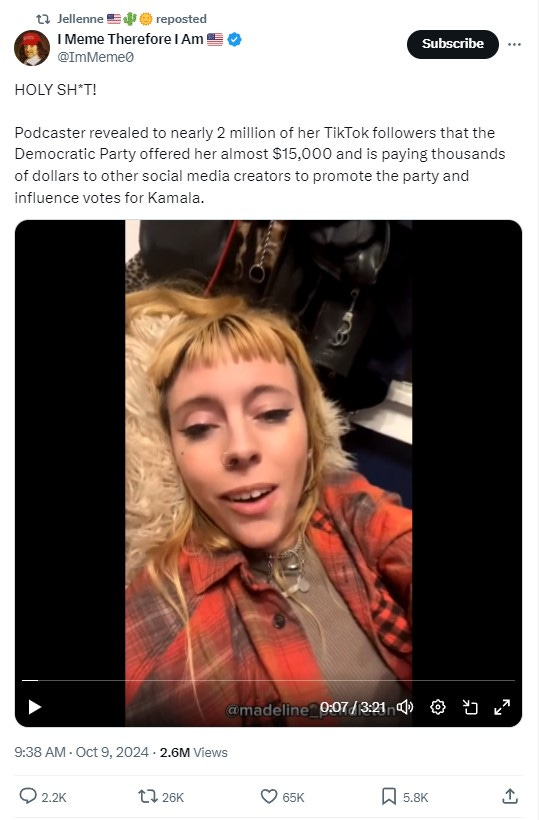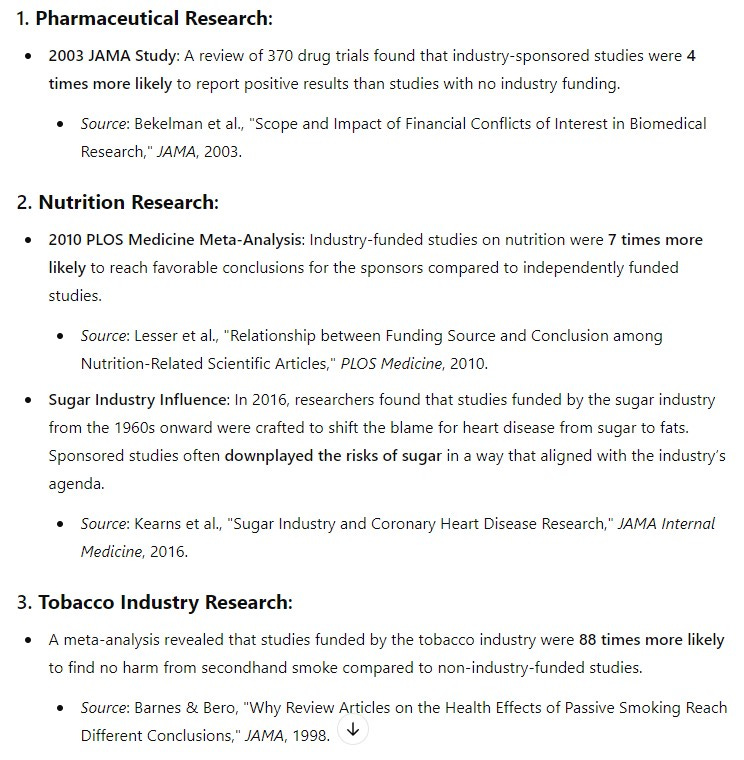Most Americans Have No Idea How Much of the Information They Consume is Bought and Paid For
Follow the money and you won’t like where it leads.
On some level, almost everyone understands that people’s opinions are influenced by money. We all expect Wendy’s to tell us how great their hamburgers taste, the car salesman to explain why they have the best deal in town, and the door-to-door vacuum cleaner salesman to tell you why his vacuum is the best on the market, whether it actually is or not.
The problem we increasingly have in our modern era where ethics have slipped and lines have become blurred is that we often don’t know the difference between people’s real opinions and what they’re saying because they’ve been paid.
If you are an influential person of just about any sort, there are now vast rivers of money that can find their way into your pocket as long as you say what the people paying you want you to say.
Let’s start small and work our way up.
When I was one of the most well-read authors on Townhall.com, I got private offers to write about certain topics. If I wrote about the topic they wanted, in the way they wanted, they’d pay me money. Sometimes I agreed with them, but other times it tended to be more of an obscure take on a subject I didn’t have a particularly strong opinion about. Usually, they wanted this to be done without telling the audience I was paid to write about the subject. Obviously, I thought it was unethical to be paid to write about a topic and not reveal that to the audience, so I never did that, although I’m sure other people did.
Of course, I never got offered the kind of money people do today. For example, here’s a TikTok influencer who could have gotten $15,000 to do pro-Kamala videos:
How many people on social media are being flat-out paid by one party or the other? I can assure you that the number is not small. In fact, given some of what the bigger, more popular social media stars get paid, it’s a safe bet that there are tens of millions of dollars changing hands. She even admits she knows other creators doing videos that fit perfectly with what she was asked to do, although they haven’t revealed to their audiences that they were paid. Were they paid? Yeah, probably, although it may be months down the road (if ever) before campaign finance disclosures let people potentially sort through large amounts of paperwork to find proof.
Of course, this is not unusual in politics.
What is the bribery scandal that has revolved around Joe and Hunter Biden for his entire presidency? Hunter Biden, who basically brings nothing to the table other than being Joe Biden’s son, was paid massive amounts by foreign companies. Why? Obviously, because they believed Hunter Biden could get them access to his father and sway his decisions. Did it happen? Almost certainly it did – those companies weren’t continuing to pay out millions if they were getting nothing in return – although who knows if there will ever be a real effort to prove it in court.
Even the positions the activists take are being impacted by who’s paying them money.
For example, hilariously, smug, entitled ultra-left-wing nutjob Matt Yglesias was just protested by a different group of ultra-left-wing nutjobs called Climate Defiance, ostensibly because they’re so opposed to fracking on environmental grounds:
Is that really a good synopsis of what happened? Maybe, but I couldn’t help but notice this post claiming that the Russians have funneled money into Climate Defiance:
So, what’s really going on here? Are these environmental wackos protesting or are they doing the bidding of Russia, which of course, wants to limit fracking in America as much as possible?
Good question.
We could ask some similar questions about the global warming industry. If governments and private industry that profit off of global warming are going to pay out over half a trillion dollars in the next decade, but only to people who agree global warming is real and manmade, how honest do you think the data you’re getting about it is?
You can get massive payoffs, massive grants, and massive support from government and private industry if you claim the planet is heating out of control or you can get locked out of all that money and blackballed if you say it isn’t.
If the exact same forces were arrayed around claiming cigarettes were healthy or bigfoot was real, you’d see many of the exact same people agreeing with those claims for exactly the same reasons – yet this is just ignored by so many people around the world. None of this is science. It’s a pseudo-science pay-for-play scheme.
Speaking of science in America… it has been heavily corrupted by money. It’s easy to understand how it happened. Doing increasingly sophisticated experiments became freakishly expensive. So, who had massive amounts of money and was willing to pay to prove that sugar was safe? The sugar industry. Who wanted to guarantee that consumers and governments had no concerns about the safety of the cell phone industry? Cell phone companies. Who wanted to prove the safety of their new drugs to the public? The pharmaceutical industry. It worked like this across a lot of industries and if you’re a scientist, what do you tell yourself? “I need the money to do these studies and they’re not explicitly demanding I find the result they want. So, why not take it?”
Why not take it?
Because much of science in America is now done by people with ethical conflicts:
“For example, a study of 185 meta-analyses of antidepressants showed that four out of five were sponsored by industry or had authors with financial ties to industry, and almost one-third had at least one author who was employed by the manufacturer of the drug being reviewed. Another study found that meta-analyses with industry funding recommended the drug being studied ‘without reservations’ almost twice as often as studies without industry funding did, 40 percent and 22 percent, respectively.” -- Sickening: How Big Pharma Broke American Health Care and How We Can Repair It
Furthermore, studies consistently show that scientists who get paid by an industry end up heavily slanting their results toward that industry. Here’s a little snippet from ChatGPT on “funding bias” and it’s worth noting, there’s lots more:
We can argue about whether this is conscious or unconscious, but there is no argument about the fact that this now happens frequently, and it dramatically undercuts how much stock we can put in scientific studies.
In a somewhat similar vein, how many times have you seen some corporation do an extremely weird, woke ad that doesn’t seem to fit with anything else they’re doing and wonder what’s going on? Are they run by woke people now? Do they really think this is what people want?
Well, maybe, but it also may be ESG pushed by massive investment groups like Blackrock that have worked with liberal activist groups. Essentially, the message they’ve been sending out has been, “Go woke or we won’t consider investing in your company.” Happily, because of Ron DeSantis and other Republican politicians refusing to invest in firms that push this nonsense, this trend is receding, but the idea has been to trick you into thinking this woke garbage is organically popular:
Executives at companies like Nike, Anheuser-Busch, and Kate Spade, whose brand endorsements have turned controversial trans influencer Dylan Mulvaney into today’s woke “It girl,” aren’t just virtue signaling.
They’re handing out lucrative deals to what were once considered fringe celebrities because they have to — or risk failing an all-important social credit score that could make or break their businesses.
At stake is their Corporate Equality Index — or CEI — score, which is overseen by the Human Rights Campaign, the largest LGBTQ+ political lobbying group in the world.
...The CEI is a lesser-known part of the burgeoning ESG (Environmental, Social, and Corporate Governance) “ethical investing” movement increasingly pushed by the country’s top three investment firms. ESG funds invest in companies that oppose fossil fuels, push for unionization, and stress racial and gender equity over merit in hiring and board selection.
As a result, some American CEOs are more concerned about pleasing BlackRock, Vanguard, and State Street Bank — who are among the top shareholders of most American publicly-traded corporations (including Nike, Anheuser-Busch, and Kate Spade) — than they are about irritating conservatives, numerous sources told The Post.
Despite the fact that every instance presented here is an ethical problem, some people would just say, “None of this is any big deal. It’s just how it is now.” However, when ethical problems become the rule, not the exception, that makes them MORE OF A PROBLEM, not less of a problem.
At a minimum, ethics require disclosure. For example, If Ronald McDonald came out in a commercial talking about how healthy a Big Mac, fries, and milkshake are, at least you could say, “Dude, that’s the mascot of the franchise in a commercial. He’s probably full of crap!” On the other hand, if McDonald’s were to fund research into their food and a scientist on their payroll talked about how an unbiased study had proven their food was healthy without disclosing the connection, that would be incredibly deceptive.
That type of deception is now happening all over the place in our society and it’s bad for the country. It lessens trust, it makes it difficult for people to be sure what they’re hearing is true and it creates cynicism. That’s why people need to be much less tolerant of these secret pay-per-opinion deals and start treating them like the huge ethical problems that they are.





